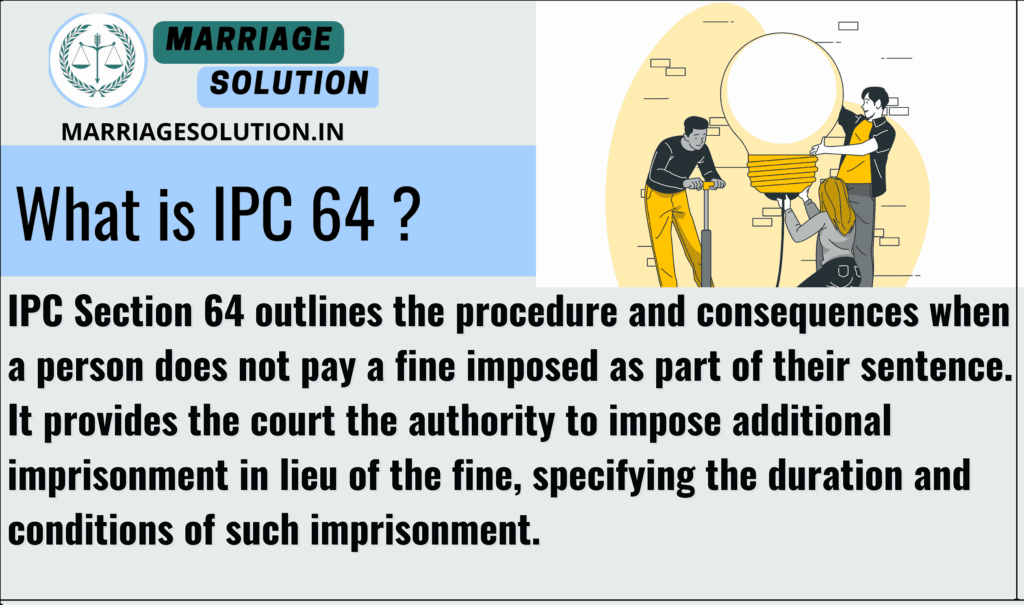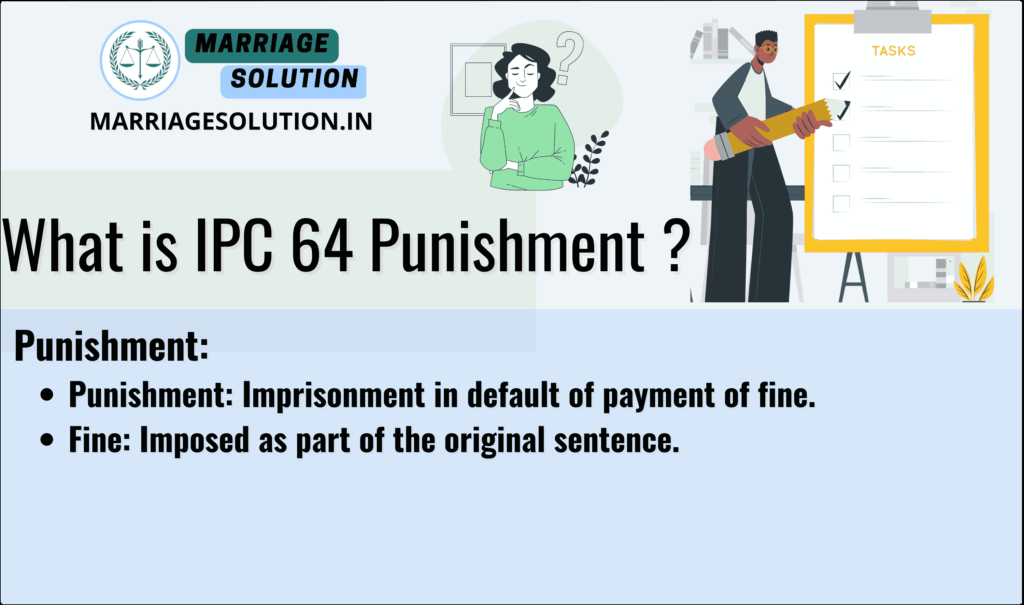Introduction of IPC 64
“The Indian Penal Code (IPC), made in 1860, provides a full set of laws for criminal cases in India. IPC Section 64 is an important section related to enforcing fines. It specifies what happens when someone fails to pay a fine that the court has ordered them to pay. This section ensures there are clear legal rules to deal with such situations.”
What is IPC Section 64 ?
IPC Section 64 outlines the procedure and consequences when a person does not pay a fine imposed as part of their sentence. It provides the court the authority to impose additional imprisonment in lieu of the fine, specifying the duration and conditions of such imprisonment.

IPC Section 64 Overview
IPC Section 64 explains what happens when someone does not pay the fine that the court has asked them to pay as punishment for a crime. It gives the court the power to put that person in jail instead of making them pay the fine.
Detailed Explanation in Simple Human Language:
Jail instead of Fine: IPC Section 64 allows the court to put someone in jail if they do not pay the fine they were supposed to pay. This makes sure the punishment has a real impact and the person cannot just ignore it.
How Long in Jail: How long the person has to stay in jail for not paying the fine depends on how much the fine was and how serious their crime was. The court decides this jail time to make it match the unpaid fine.
Already in Jail: If the person is already in jail for another crime, the extra jail time for not paying the fine can either be added to their current sentence or happen at the same time, depending on what the court decides.
Court’s Decision: The court has a lot of power to decide the rules and conditions of the jail time for not paying fines. This allows the court to consider each case separately.
Limits: There are legal limits on how much jail time can be given for not paying a fine. These limits make sure the punishment is fair and not too extreme.
Purpose: The main purpose of IPC Section 64 is to make sure people follow the court’s order to pay fines. It acts as a warning that they cannot ignore the fine without consequences.
IPC 64 Punishment
Punishment: Imprisonment in default of payment of fine.
Fine: Imposed as part of the original sentence.

64 IPC bailable or not ?
Bailable or Not: The bailability depends on the primary offence for which the fine was imposed.
Section 64 IPC in short information
| Offence | Definition | Punishment | Bailable or Not |
|---|---|---|---|
| Non-payment of Fine | Failure to pay a court-imposed fine | Imprisonment in default of payment | Depends on primary offence |
IPC 64 FAQs
What happens if a fine is not paid under IPC Section 64?
The court can impose a term of imprisonment in default of payment of the fine.
How is the duration of imprisonment determined for non-payment of fine?
The duration is decided by the court, considering the amount of the fine and the nature of the offence.
Can the imprisonment for non-payment of fine run concurrently with other sentences?
Yes, the court can decide whether the imprisonment should run concurrently or consecutively with other sentences.
Are there limits on the imprisonment period for non-payment of fine?
Yes, there are legal limits on the maximum period of imprisonment that can be imposed.
If you need support with court proceedings or any other legal matters, don’t hesitate to reach out for assistance.
Court or any other marriage-related issues, our https://marriagesolution.in/lawyer-help-1/ website may prove helpful. By completing our enquiry form and submitting it online, we can provide customized guidance to navigate through the process effectively. Don’t hesitate to contact us for personalized solutions; we are here to assist you whenever necessary!
